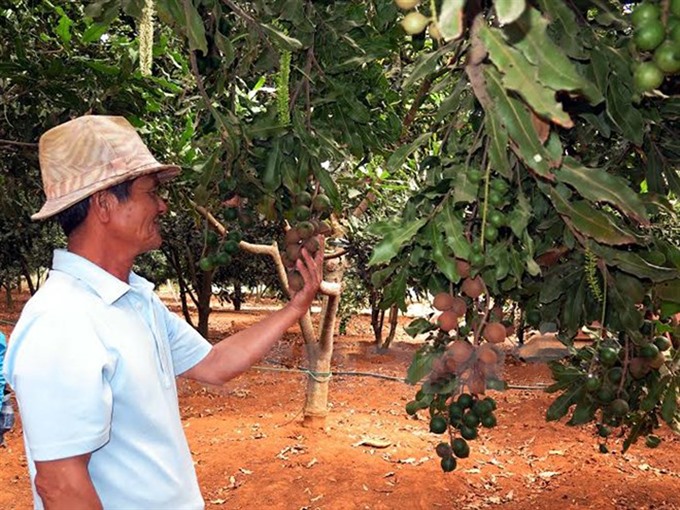 Society
Society

Nguyễn Việt Hùng, a farmer in Lâm Hà District of the Central Highlands Lâm Đồng Province heaves a sigh with hard-to-conceal disappointment on his face when visiting his macadamia garden.
 |
| A macadamia orchard in the Đơn Dương District of Lâm Đồng Province. — Photo vietnamplus.vn |
LÂM ĐỒNG – Nguyễn Việt Hùng, a farmer in Lâm Hà District of the Central Highlands Lâm Đồng Province heaves a sigh with hard-to-conceal disappointment on his face when visiting his macadamia garden.
Five years ago, he bought 50 macadamia trees and planted them along with coffee plants. Now, 40 of them have died. The other ten keep growing higher but what he has been looking forward to - nuts - have barely appeared.
He plans to cut down all ten trees, which grew from bad-quality seeds, and replace them with 200 new high-quality seeds.
Trần Đức Xuân, a farmer from the same district, suffered similar losses: 70 macadamia trees in his garden have produced only about 50kg of edible nuts per year. These yield is nothing much compared to the large investment in seeds. He thus decided not to sell the nuts but to keep them for his family’s daily food or give them as presents to relatives.
Việt Nam’s farmers started planting macadamia trees about 10 years ago. Macadamia cultivation was expected to reap considerable benefits for farmers in the Central Highlands region, where conditions are best suited for the plant.
The macadamia nut has outstanding nutritional value. Experts point out that compared with other common edible seeds, such as almonds and cashews, macadamias is high in fat and low in protein. It also has the highest amount of mono-unsaturated fats among any known seed and can also be made into cooking oil and powder-like chocolate, or used in beauty-care products.
Hùng, Xuân and many other farmers in Central Highlands provinces expected the so-called “queen of nuts” would yield major profits and change their lives. The results from promising trees, however, were a disappointment.
Many Central Highlands farmers, seeking cheap seeds, bought trees of unknown origin on the local market or from individuals for only VNĐ25,000 ($1.1) per tree. compared to high-quality seeds which went for VND70,000-80,000 ($2.1-3.5).
But even the high-quality trees were not planted on suitable soil, said Huỳnh Ngọc Huy, who founded Viet Nam Association of Macadamia.
According to Trần Vinh, deputy head of the Central Highlands Agriculture and Forestry Science Institute, macadamia is not suitable for all Central Highlands soil. It is a tropical plant requiring high humidity and proper cultivation techniques. Many farmers suffered losses because they were not aware of this information.
Experts’ study shows that only eight provinces are suitable for macadamia planting, namely Đắk Nông, Lâm Đồng, Đắk Lắk, Gia Lai, Kon Tum provinces in the Central Highlands region and the three northern provinces of Sơn La, Lai Châu, Điện Biên.
Ba Vì District in Hà Nội might also be suitable but further study is needed.
Nguyễn Trúc Bồng Sơn, director of the Agriculture Extension Centre of Lâm Đồng Province, said that although the provincial Department of Agriculture and Rural Development has warned locals about the risks of low-quality seed, local farmers ignore them.
‘I hope that they will be vigilant and not too hasty to follow the trend and then ask for compensation,” he said.
According to agricultural experts, Ministry of Agriculture and Rural Development, local agricultural departments and agencies have not paid due attention to macadamia growing and farmers took a wrong direction.
Experts warned that farmers should buy seeds from companies licensed by provincial departments of agriculture and rural development. For example, the Vinamacca company in M’Đrắk District in Đắk Lắk.
Farmers should only pay 100 per cent of the contract with the suppliers after three to four years when trees produce nuts. Prestigious companies are ready to commit quality and accept this payment method, experts said.
Meanwhile, local authorities from commune, district to province levels must take responsibility in controlling macadamia tree quality and acting as facilitators between farmers and enterprises.
Phan Xuân Dũng, chairman of the National Assembly Committee on Science, Technology and Environment, said that to make macadamia into a major growth in the Central Highlands region and help farmers lift themselves out of poverty, scientists must continue to study new seeds of high quality and areas best suited for planting them.— VNS




